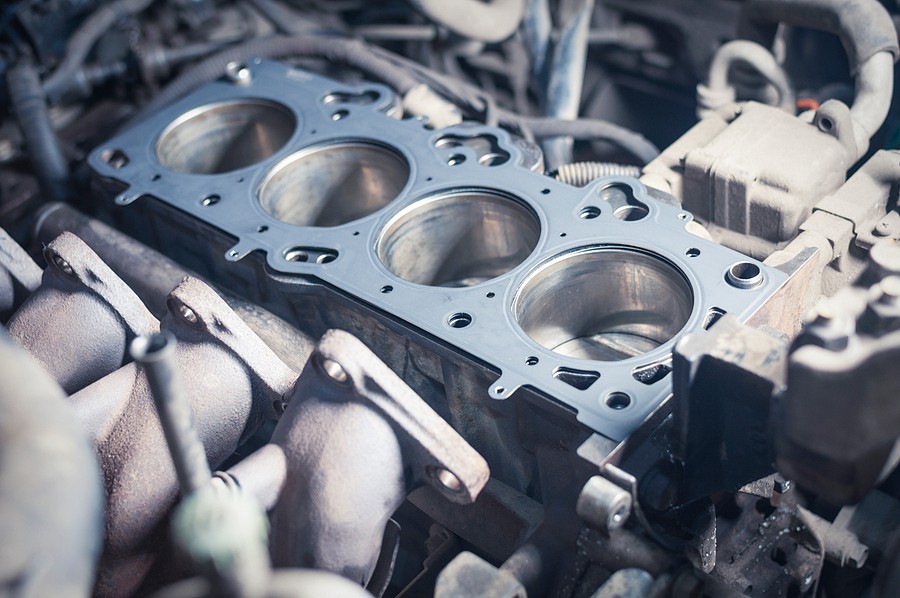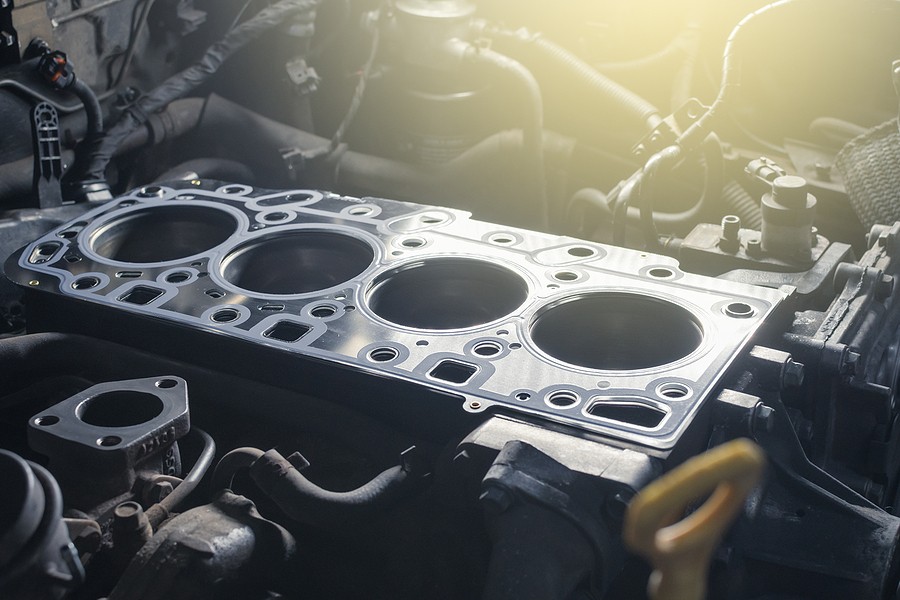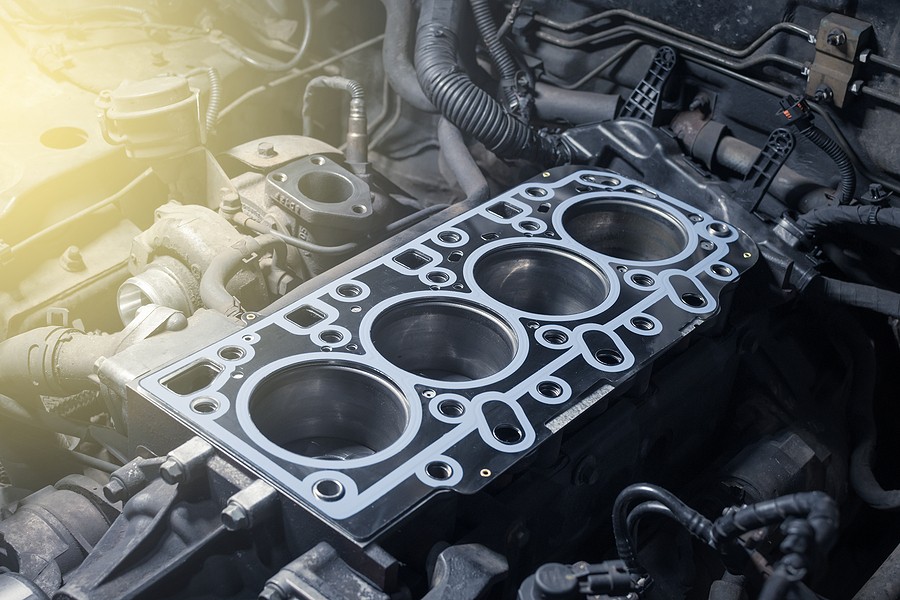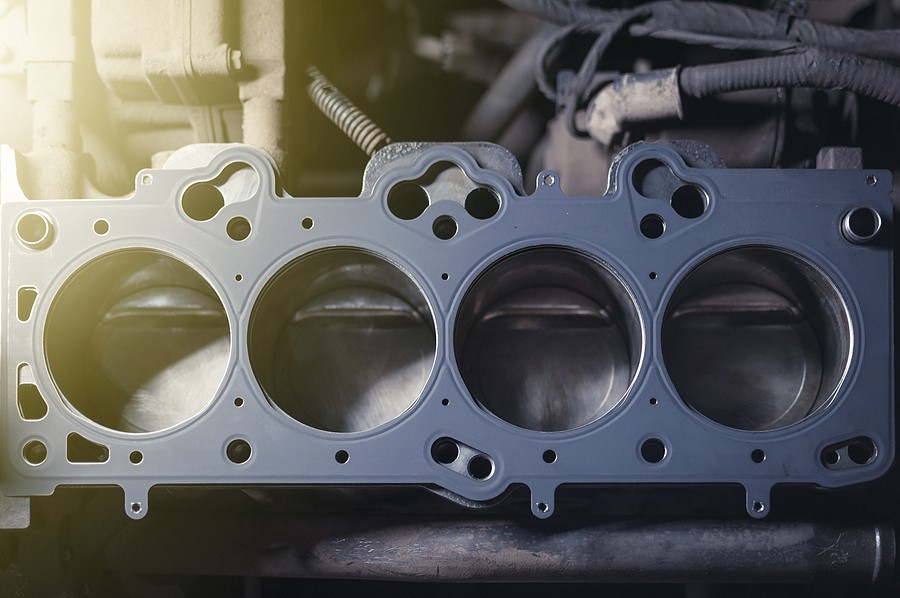If you suspect that your car has a blown head gasket, check out these 10 symptoms for “how to tell if your car has a blown head gasket?”
- A mixed coolant and oil
- Engine overheating
- Strange oil substance
- Weird smoke out of the tailpipe
- Fluid leaks
- Radiator bubbles
- Failing spark plugs
- Bad cooling system
- Engine misfire
- Difficulty starting
Your vehicle contains several interacting components. You might be familiar with some of them but not every component. For example, you might know the engine, the battery, the transmission, but do you know anything about the head gasket?!
Even if you know what's the head gasket, this article will be extremely helpful for you. It will provide you with a general idea about that head gasket and what it does. It also provides you with some information about when this component is expected to fail, so you resolve the issue before it gets more complicated. Finally, it highlights expected repair costs for fixing a blown head gasket.

What is the head gasket, and what does it do?
Before we dig into the details about how to tell if your car has a blown head gasket car, we must get a general understanding of the purpose of this head gasket in your vehicle.
The head gasket can be a minor component within your engine compartment, but it plays a major role in maintaining the engine and preventing any catastrophe. This component is very thin, and it sits on the top of the cylinders to seal them completely. Hence, it prevents any gases from escaping from the cylinders to the surrounding components found damaging them.
The head gasket also prevents any fluids from leaking inside the cylinders and causing issues to the combustion process. As a result, your vehicle generates the required energy without consuming too much fuel and causing any catastrophic outcomes.
Over time of use, the hit gasket is expected to fail because it's not designed to last forever. However, it is made of very durable material to withstand the extreme conditions of the engine. Unfortunately, when this happens, you get to resolve the issue by replacing it because otherwise, you'll deal with more complications that will cost you the entire vehicle in some instances.
How long does the head gasket last?
As we mentioned earlier, the head gasket is made of very durable material, making it less for a very long time. According to most vehicles’ manuals, the head gasket is expected to last up to 200,000 miles which is great mileage for major vehicle problems.
However, this does not guarantee that you will not deal with major head gasket problems at the early stages of your vehicle’s lifespan. Therefore, you need to understand all potential symptoms of a failing or blown head gasket.
How to tell if your car has a blown head gasket? 10 potential symptoms
As you might notice, the head gasket is essential in your vehicle, and when it goes bad, you'll deal with all sorts of complications that will impact your driving experience and make it a nightmare.
As described by most mechanics, you need to maintain the head gasket and keep an eye for any symptoms that could indicate a failing or blowing head gasket. Here are some of the typical symptoms of a blown head gasket to help you answer the question, “how to tell if your car has a blown head gasket?”

1. A mixed coolant and oil
The first and most common symptom of a blown head gasket is when you notice that the coolant and oil got mixed. These two fluids run around the engine, but they have their own pathways, and they should never get mixed. When this happens, it indicates some leak within the engine compartment caused the issue, and a blown head gasket would be a very common culprit for this issue.
You will notice that these fluids got mixed when you perform a visual inspection of the coolant and see that it's not looking the way it should or used to. If you confirm this, you're dealing with a significant issue that you must take seriously and consult your mechanic immediately.
2. Engine overheating
The other current symptom of a blown head gasket is when dealing with severe engine overheating. You will notice this by monitoring the temperature gauge on the dashboard here. If you notice that it's reading very high, it could indicate a blown head gasket.
Remember that engine overheating is one of the worst enemies that could impact your vehicle. Therefore, what the problem has to do with a blown head gasket or any other issue, you must take it seriously and resolve it as soon as possible.
In some instances, engine overheating might prevent you from driving your vehicle a single inch. Therefore, check with your mechanic and see if you can continue driving your car or if you'd better tow it to the nearest repair shop.
3. Strange oil substance
As we mentioned earlier, you can check your coolant to confirm whether the oil and coolant got mixed. You can also look at the oil to confirm that it got mixed with anything.
Typically, when the head gasket blows up, you'll notice that the oil looks more like a milkshake. that is a very severe sign indicating that the head gasket issue got more complicated and might result in engine catastrophic damage in no time. Thus, with better stop your vehicle and consult your mechanic immediately.
4. Weird smoke out of the tailpipe
When the head gasket blows off, you'll see multiple strange symptoms simultaneously. Along with the mentioned symptoms, you'll also notice some weird white smoke coming out of the tailpipe. This smoke is typically an indication of a burning coolant which means that this: got inside the Sanders.
The longer you own your car, the more you'll notice that the tailpipe smoke should not have a clear color typically for modern vehicles. So when you notice that the smoke is getting different, this is a strong indication that you have an internal car problem.
Whatever the cause of this problem is, you must consult your mechanic immediately and have him look at the engine compartment to confirm that the issue doesn't have to do with a blown head gasket.

5. Fluid leaks
Along with the different mentioned symptoms, a blown head gasket might also cause external fluids leaks. Typically, these fluids would be either the oil, the coolant, or both.
Fluid leaks are not a fun situation, and they can immediately lead to a significant problem for the vehicle overall. Therefore, whenever you see any fluid dripping underneath the car, you must pull over and stop your vehicle as soon as possible. Sometimes the fluid leak could be as simple as water coming out of the air conditioning system, which is not very serious, but you cannot assume this unless you confirm with your mechanic.
6. Radiator bubbles
On some occasions, a blonde head gasket might cause some bubbles inside the radiator, which is also related to whatever issues happen to the cooling system overall. Therefore, if you're comfortable enough performing a visual inspection of your radiator, check for any signs of bubbles. If that's the case, you're most likely dealing with a blown head gasket. Therefore, you must consult your mechanic as soon as possible.
7. Failing spark plugs
When they hit, the gasket blows up completely, impacting all components around the cylinders. Therefore, don't be surprised to deal with completely failing spark plugs if you ignore the problem for a long time.
Spark plugs are minor components inside the cylinders, and they can get easily affected by any external factors. Therefore, when the coolant or oil gets inside the spark plugs and clogs them, you might deal with spark plug failures that add to your repair list when you have to fix this car.

8. Bad cooling system
With all that's mentioned about the potential consequences of a blown head gasket, it is also not surprising to deal with major cooling system complications affecting every single component around the cooling system here; therefore, once your mechanic confirms a blown head gasket, he also needs to look at the cooling system and confirm that the extent of the damage did not impact the cooling system components as well. Unfortunately, you must resolve these issues to get your vehicle going without any additional complications if that is the case.
9. Engine misfire
Engine misfiring is a normal outcome of a blown head gasket. If you don't already know, engine firing happens because of the following issues: troubles with the fuel supply, problems with the air supply, or issues with the spark timing.
As we mentioned earlier, all of these things could happen due to a blown head gasket. Therefore, don't be surprised to deal with engine misfiring immediately after a blown head gasket.
10. Difficulty starting
Finally, bulleted gaskets might prevent your vehicle from starting if the problem gets very complicated and affects sensitive components around your engine compartment. At the minimum, if all spark plugs get damaged, your engine will not be able to generate any energy and, therefore cannot you'll notice that the engine is cranking, but the car is not moving at all.
This is a very late stage of blown head gasket consequences. We hope you monitor for all the minor symptoms of a blown head gasket and never get to this point so you don't deal with significant complications that will cost you the entire vehicle.
How much does it cost to fix a blown head gasket?
Unfortunately, fixing a blown head gasket is not a cheap repair because it should cost you somewhere between $1000 and $2000. This price range differs significantly depending on your vehicle's brand and where you get the job done.
There are some instances where major complications in a blown head gasket might damage the entire engine. Therefore, we might get to where your engine fails and your vehicle stops working. Then, you have to evaluate whether it's worth fixing the head gasket or selling your vehicle instead.

Final thoughts
Dealing with a blown head gasket is never font because it's one of those critical situations that costs a lot of money and prevents your vehicle from running. This article summarized the 10 most common reported symptoms of a blown head gasket to healthy answer the question, “how to tell if your car has a head gasket?”
Whenever you confirm that your vehicle has a blown head gasket issue, you got to take your vehicle to the mechanic and resolve the problem or consider selling the vehicle if its repairs costs pile up—looking for someone to buy your car with a blown head gasket? Cash cars buyer is always here to help you!
Cash Cars Buyer is one of the top-rated car removal companies in the nation that guarantees to pay you the top dollars and provide you with free towing despite your living location around the United States.
Our process is very straightforward and doesn't take more than a couple of days to get your car removed safely and for the most money.
All it takes you is to:
- Describe your car's type and condition
- Receive our instant free quote
- Accept the quote
- Get your car removed and receive your cash payment on the spot!
To learn more about our process and our team, you can reach out to us by calling us at (773) 791-4363 or visiting our home page click on the free instant online offer.


